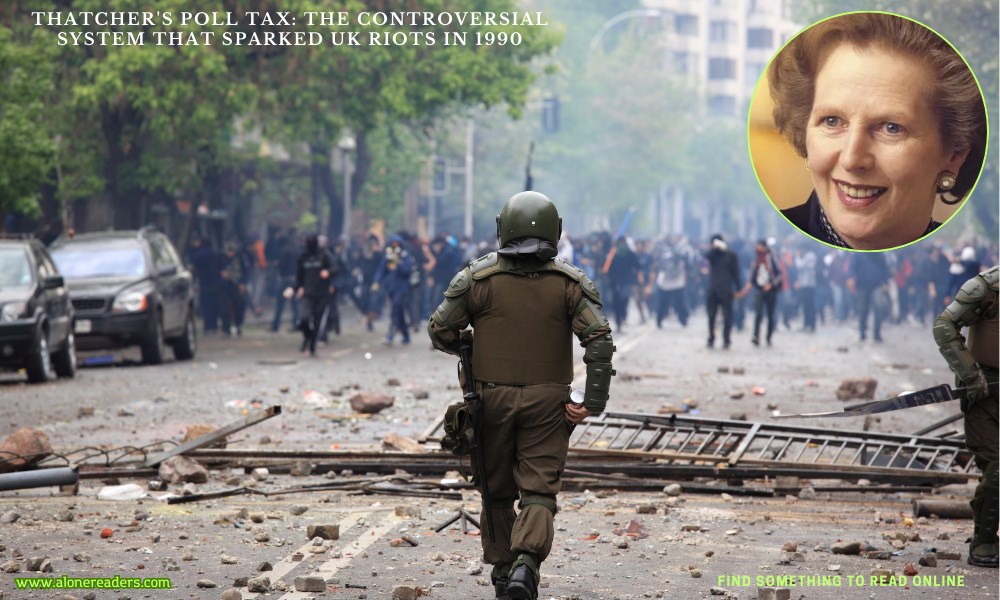
In 1990, the United Kingdom witnessed one of its most significant civil disturbances in modern history. The introduction of the Community Charge, widely known as the Poll Tax, under Prime Minister Margaret Thatcher's government, ignited widespread protests and riots across the country. This controversial tax reform aimed to replace the existing system of local government rates based on property values with a flat-rate per capita tax. The new system required every adult resident to pay a uniform amount, regardless of their income or property value.
The rationale behind the Poll Tax was to create a more straightforward and transparent method of local taxation, which would make local councils more accountable to their residents. However, the flat-rate nature of the tax meant that it disproportionately affected the less affluent, as the tax was the same for everyone, regardless of their ability to pay. This led to significant public outcry, particularly among the working class and those on lower incomes who felt the burden of the tax more acutely.
The implementation of the Poll Tax began in Scotland in 1989, a year before it was introduced in England and Wales. The Scottish experience served as a harbinger of the widespread resistance and discontent that would follow. Protests and demonstrations erupted almost immediately, with many people refusing to pay the tax. The resistance movement gained momentum, organizing mass non-payment campaigns and large-scale demonstrations.
On March 31, 1990, the opposition to the Poll Tax culminated in a massive demonstration in Trafalgar Square, London. Organized by the All-Britain Anti-Poll Tax Federation, the protest drew around 200,000 people from across the country. What began as a peaceful protest quickly escalated into violence, as clashes between the police and protesters erupted. The situation spiraled out of control, leading to extensive property damage, numerous injuries, and hundreds of arrests. The media widely covered the riots, depicting scenes of chaos and violence that shocked the nation.
The Poll Tax Riots, as they came to be known, marked a turning point in British politics. The scale of the unrest and the intensity of public anger put immense pressure on the Conservative government. Critics argued that the tax was not only unfair but also poorly implemented, with administrative issues exacerbating the public's frustration. The opposition Labour Party capitalized on the discontent, using the issue to galvanize support and challenge the Conservative government's legitimacy.
Margaret Thatcher, who had been a dominant and transformative figure in British politics since becoming Prime Minister in 1979, found her leadership increasingly questioned within her party. The Poll Tax controversy was a significant factor in eroding her political support. Senior members of her party began to express doubts about her leadership, and the Poll Tax debacle contributed to a growing sense of disillusionment and rebellion within the Conservative ranks.
In November 1990, Thatcher faced a leadership challenge from Michael Heseltine, a prominent Conservative MP and former Cabinet minister. Although she won the first round of voting, it was clear that her support had weakened. Realizing that she no longer commanded the full backing of her party, Thatcher resigned as Prime Minister on November 22, 1990. Her resignation marked the end of an era in British politics and the beginning of a new chapter under her successor, John Major.
Following Thatcher's departure, the Poll Tax was quickly repealed. John Major's government introduced the Council Tax in 1993, a new system of local taxation based on property values but with provisions for income-related discounts. The Council Tax was designed to be fairer and more acceptable to the public, addressing many of the criticisms leveled at the Poll Tax.
The legacy of the Poll Tax and the riots of 1990 remains a significant chapter in the history of British politics. The events underscored the importance of considering the social and economic impacts of tax policies and highlighted the potential for widespread civil unrest when public sentiment is ignored. The Poll Tax controversy also demonstrated the limits of political power and the importance of responsive and accountable governance.
In conclusion, the introduction of the Poll Tax by Margaret Thatcher's government in 1990 was a deeply controversial and ultimately disastrous policy. The widespread opposition and ensuing riots revealed the depth of public dissatisfaction and significantly contributed to Thatcher's political downfall. The Poll Tax riots serve as a stark reminder of the critical role of fairness and equity in tax policy and the potential consequences of failing to heed the voices of the people.